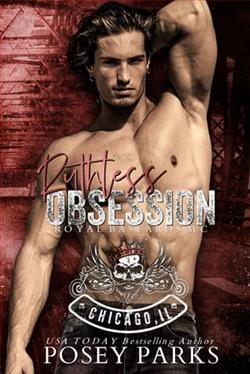Page 105 of For Pleasure Or Worse
Veterans Affairs medical services ranged from therapy and mental health services to general practitioners, preventative measures, illness, injuries, dentists, you name it. I had never used any of my benefits out of pure laziness. Really, if I was ever sick it was easier to be seen in an urgent care than jump through the hoops of making appointments for the same result. I was like any other adult turned off by the idea of making phone calls and filling out paperwork unless it was damn near detrimental.
But when I made the choice to finally talk to someone about what I’d been going through, finding someone qualified, who knew the minds of men and women who had been deployed, felt like the smartest, most natural thing to do.
“Are you nervous?”
“I guess you could say that.” Ahead of us the gray double doors of the brick building opened and closed. Another guy around my age walked out into the stifling June sunlight in an olive drab T-shirt, squinting and sticking his hands in his shorts pockets.
“Don’t be,” Tally said. Her soft, tiny hand reached over to rest comfortingly on my knee. I hadn’t realized it was bouncing until it stopped. “Just be yourself. They’re professionals. Remember that nothing you say is wrong, because it’s not a test to pass or anything like that. You’re going to do great.”
The corner of my lip twitched upward. “I don’t know what I’m supposed to talk about. I don’t want to waste this guy's time, either. What if this is all just normal everyday struggles and I’ve chalked it up into something it’s not?”
“Just because your trauma isn’t the same size as somebody else's doesn’t mean it deserves any less attention,” she said. “Some people need an unbiased sounding board, and if that’s all this is for you, then that’s fine, too. There’s no mandatory life-altering prerequisite to therapy.”
The stigma around it was what had deterred me for so long. I thought I didn’t have enough of a reason to seek out professional help when there were real veterans struggling, real statistics showing how hard the acclimation from military back to civilian life really was. In my mind, if I wasn’t in danger of becoming one of the twenty-two a day, I was wasting time and resources. But what I never thought about was how there was a time each of those vets was in the same boat as me, embarrassed to ask for help, unwilling to self-reflect, hoping that they might be able to figure it out on their own.
My commitment to showing up today was a step in the right direction. Maybe the beginning of something completely unexpected if it went well enough. The difference in my life from just six months ago was stark, and glazed with potential to be apoint that I looked back on years from now as the beginning of everything. The turning page from part one to part two. The day we got engaged, the world shifted on an axis, and like dominos, the rest fell loudly and chaotically into place.
For the most part.
I put my hand over Tally’s and squeezed it gently. “I won’t talk about our thing,” I told her. “If you don’t want me to.”
“I want you to talk about whatever you need to. It’s a big part of your life, and if it unlocks some kind of doorway to understanding more about yourself then I would never tell you not to. This is strictly about you, Mateo. Be as selfish as possible. It’s all confidential.”
She was so adorably supportive, and I hated myself for ever thinking this would be a burden for her to manage. Lifting Tally’s fingers to my lips, I kissed each knuckle, then flipped her hand and pressed my lips to each of her fingertips and her palm. She slid her open hand against my stubble, resting it on my jaw and running her thumb across my cheek.
“Selfish, got it.”
Dr. Henry Brincklerreplied to every answered question with another question. It felt very much like an adult conversation with an inquisitive toddler. The kind that had you questioning the validity of your information after the sixth consecutive, “Why?”
My expectation was to be picked apart and scrutinized, but it was more like getting stripped down to the core aspects of myself. How old I was, what I did, where I was deployed, my family dynamics, why I decided to show up at therapy for thefirst time and then why I thought this was the right time to take that step.
Doctor Brinckler, Brinck, as he told me to call him, sat across from me in a matching dark green velvet chair with a round coffee table between us. There was a psychology textbook and a geode in the center of it that I couldn’t stop staring at, and I caught myself sliding my palm up and down the arm of the chair several times while I was answering his open-ended question.
Doc had a pad and pen resting on his crossed knee, but didn’t use it, like it was more decorative than functional, and I found that I was waiting the entire time to say something interesting enough for him to record. Until it was all that I could think about, and I was irritating myself with how much I wanted to feel like a real, damaged case and not just another veteran coming into the office with the same story he’d heard a thousand times before, and the same advice to be given.
I told him about Angelo, and that spiraled into the misplaced resentment I once felt for my brother, and how we didn’t see one another for years, then the wedding planning, the best man debacle, and Vegas a couple weekends ago when he stood up for my wife and got himself thrown in jail overnight to defend her honor.
My tangent lasted fifteen minutes before I ran out of material and even then Henry stared into my soul with a contentment that was more blasé than impressed and more curious than interpretive.
“You don’t want to write any of that down?” I gestured to the pen and paper.
His head tilted. “Do you want me to?”
Lodging my tongue in my cheek I hid my chagrin. My arms crossed over my chest. “I thought that’s what we were doing.”
Doc’s bright blue eyes narrowed and his jaw twitched so quickly into a smirk I almost missed it. Then he picked the padup for the first time and scribbled something short and direct onto it. Which was just about the worst thing in the world that he could have done. Now instead of worrying over why he wasn’t writing anything at all, I was twice as worried over the few words in black ink that somehow defined everything about me.
“What was that?”
“Very important notes.”
I let my head fall back on the soft edge of the chair and started counting the points on the popcorn ceiling. Maybe therapy wasn't for me. Or maybe I’d watched too much television that portrayed going to a psychologist as some mind-altering, eye-opening experience where the doctor said one slightly poetic, riddle-esque thing and the plot came crashing down around them. Everything all of a sudden making sense. Like Fleabag.
I did not want to fuck a priest, so my problems might be unsolvable.
“Do you think you seek validation from the people in your life as a grading system for your worth?”
Oh, fuck. I stood corrected.















